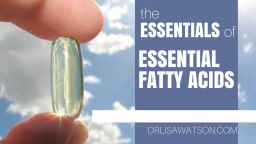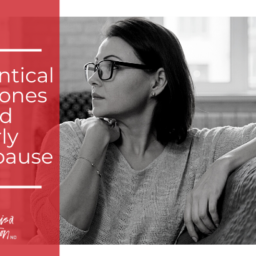
A woman, let’s call her Nicole, enters my office with a concern of acne. Acne in an adult woman is, unfortunately, not uncommon these days. After spending some time talking to Nicole we find that she also has hair loss from her scalp, and hair growth on her chin as well as irregular periods.
If you’re familiar with PCOS you may recognize these as the most common symptoms of PCOS – irregular (or absent periods), acne and hair growth on the face or hair loss from the scalp.
But it wasn’t PCOS for Nicole. It was something else.
Non-Classic Congenital Adrenal Hyperplasia
Non-classic congenital adrenal hyperplasia (NCAH) is a condition that usually develops around the age of puberty and can impact both boys and girls (this article is just about the girls – sorry guys!)
NCAH is an inherited condition where a person does not make enough of a specific enzyme, 21-hydroxylase, that converts the hormone progesterone into cortisol. When this enzyme doesn’t work more progesterone is shifted into testosterone and levels of testosterone and other androgens increase.
Why Does NCAH Look Like PCOS?
Both PCOS and NCAH have symptoms that are the result of high androgens – testosterone, androstenedione, and dihydrotestosterone. However, the source of the high androgens is different.
In PCOS the elevated androgens come from overstimulation of the ovaries by follicle stimulating hormone (FSH), without the corresponding ovulation – leading the ovaries to continue to produce large amounts of testosterone over time.
In NCAH, the testosterone comes from the conversion of progesterone (and 17-OH progesterone) into androstenedione and subsequently testosterone.
In either case, high testosterone in a woman leads to oily skin, acne, facial hair, and scalp hair loss. Not such a pretty picture.
So, is my PCOS actually NCAH??
There are some warning signs that your PCOS may actually be NCAH.
- Did your puberty start early – before 10 years of age? Or was it significantly delayed – after 15 years of age?
- Did you have premature development of pubic or underarm hair?
- Are you shorter than average height for an adult?
All of these findings are more common in NCAH than in PCOS.
But ultimately the diagnosis of NCAH requires a blood test.
17-OH Progesterone Testing
The first test for non-classic congenital adrenal hyperplasia is a 17-OH progesterone test. If your levels of this test are elevated, then you most likely have NCAH. While this test is routinely done in newborns, the non-classic variant can be missed until puberty.
If the 17-OH test is positive then a follow up test, known as the ACTH stimulation test, is done to confirm the diagnosis.
As NCAH is the most common autosomal recessive disorder in humans (you have to have two mutated copies of the gene to get this condition) – impacting around 1 in 100 people, this test is highly recommended if you have PCOS – especially if you don’t seem to fit the typical PCOS picture.
Moving Forward
NCAH, for some women, causes little to no difficulty. Other women have issues with abnormal hair growth/ hair loss or acne that can be difficult to treat. Other women have issues with infertility. It is a variable condition. Talk to your Naturopathic Doctor or Medical Doctor if you think your PCOS may actually be NCAH, and learn about your diagnosis and treatment options.

















This is fascinating. Do you know where I can find more information about NCAH?
The National Institute for Health has a good (scientific) overview: https://rarediseases.info.nih.gov/diseases/9592/non-classic-congenital-adrenal-hyperplasia-due-to-21-hydroxylase-deficiency